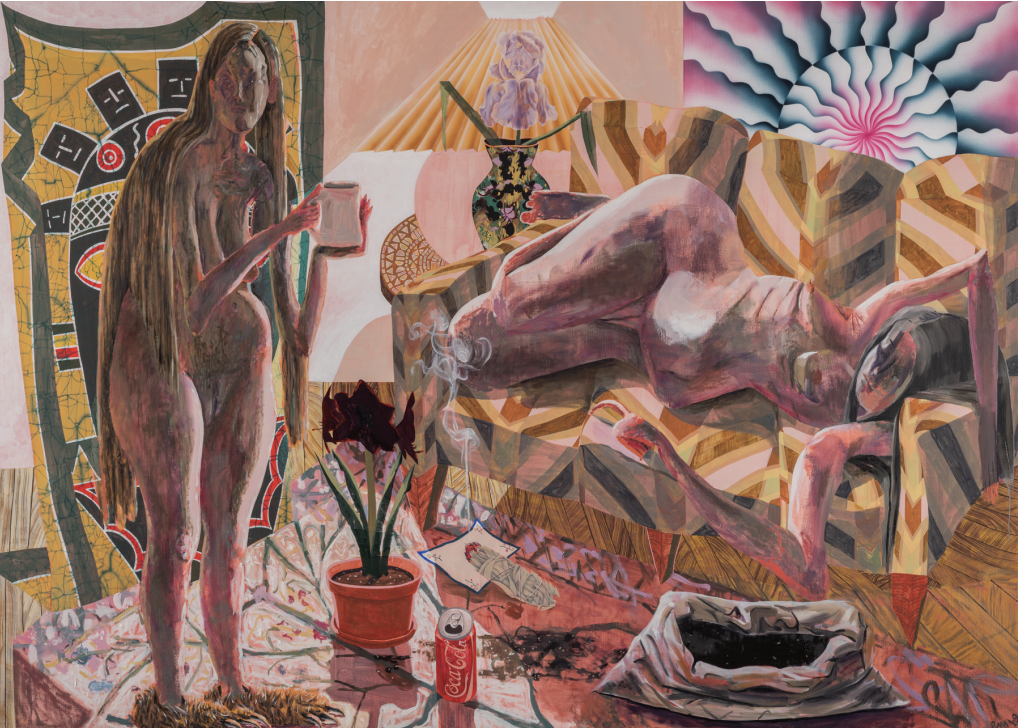The “Hallie Ford Fellows” exhibition held at the University of Oregon’s Jordan Schnitzer Museum of Art (JSMA) contains a vast number of works from 15 local artists selected by The Ford Family Foundation. On Jan. 6, WSU Vancouver provided access to the Virtual Artist Talk event, where three different artists discussed the inspiration behind their pieces, including WSU Vancouver’s very own fine art professor, Avantika Bawa.

(Photo courtesy of Mario Gallucci)
The exhibition was originally designed for an in-person presentation at the gallery, but due to the COVID-19 pandemic, it had transferred to an online-only format six weeks after opening day. The JSMA uploaded photos and a virtual tour so the exhibition could still be enjoyed by the public. You can find the virtual tour here.
Danielle Knapp, an art curator at JSMA, has been working on the Hallie Ford Fellows exhibition for over a year. When asked for information about The Ford Family Foundation, she said visual arts and rural education are the two main focuses upon selecting a recipient of The Hallie Ford Fellowships award, a $35,000 award granted to five artists.
“The Ford Family Foundation, they support so much in the state. It’s incredible what they make possible for artists, for institutions, collectives and everybody who is doing work or trying to do work,” Knapp said. “We thought, we still want to share this work in this exhibition with as many audiences as we can. Even though that means for most people, it will not be the in-person experience that we had hoped to have, that is something at least we can put out into the world.”
Virtual Artist Talk moderator Jenelle Porter, a Los Angeles based curator and author, helped set up the exhibition over Zoom. Porter stated she was disappointed that the exhibition had to be moved to a virtual medium as it takes away the value of experience when seeing art in person.
“The benefit of any virtual platform for the arts is that anyone anywhere can obtain a working knowledge of an exhibition, concert, dance. But experiencing art on your laptop or phone screen is nothing like seeing it in person, and just as importantly, sharing that experience with others. I miss being in rooms with people,” Porter said. “My life and career is rooted in and grounded by art, and I wholeheartedly believe in the value of seeing it in person, in real life.”
Bawa was the first artist to talk and share her presentation that focused on her series called “Coliseum,” inspired by the Veterans Memorial Coliseum building in Portland. Bawa also discussed her process for creating art, which consists of drawing many sketches for each piece. She was previously selected as a Hallie Ford Fellowship recipient in 2018, and various pieces of Bawa’s work can be found here.
“[‘Coliseum’] started in 2015, and eventually led to a show at the Apex space at the Portland Art Museum. [My] interest in the coliseum started through walks I would take back after Blazer games. … I knew I wanted to do something with the grid, with the steel, the pure structure, the formal beauty of the building, which is ultimately what draws me most to it.”

(Photo courtesy of Roger Dorband)
Pat Boas was the next person to display her work during the online discussion. Boas works as an artist out of Portland and is the director of the School of Art and Design at Portland State University. Boas was selected as a Hallie Ford Fellowship recipient in 2017 and presented multiple works from her ongoing series called “Abstraction Machine.” You can find pieces of Boas’s work here.
“I make abstract work that springs from a fascination with how language works. … For me, language is the element in which we swim, but my work is animated in particular by the way our experience of language resides in our bodies as well as our brains,” Boas said. “I look at the abstract and the material qualities of language and especially the places where it falls apart, where it fails to give us the whole picture. Often, I have played with ways to interrupt and unsettle information, gleaned from popular print sources, phrases read or heard and I am looking for ways then to stretch language’s limits.”
The final artist, Elizabeth Malaska, a 2018 Hallie Ford Fellowship recipient, discussed one of her pieces titled, “Controller,” which contains shapes inspired by human anatomy. The works Malaska chose to share are from her series called “Of Myth or of Monday.” You can find more of Malaska’s work here.
“In terms of making artwork, I have always been really attracted to drawing and painting the human figure. … The human form really fascinates me on so many levels, and because of the history of Western painting and its overwhelming focus on the figure, painting bodies is also a means through which I can explore the history of painting itself,” Malaska said.
As The Ford Family Foundation celebrates and supports local art in Oregon state, these artists continue to connect the community through stories of inspiration and thought-provoking themes behind each of their works.
